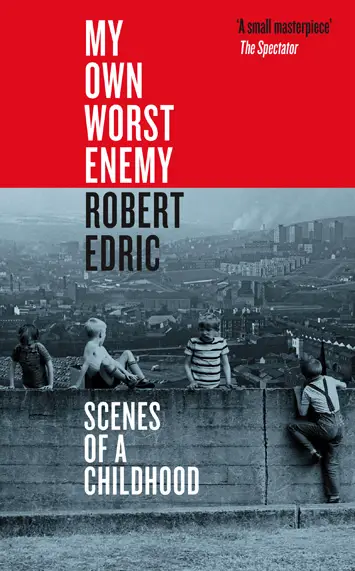My Own Worst Enemy by Robert Edric – Review

By Clare Jenkins
I moved to Sheffield from London in the 1980s, to work on The Star, the city’s evening newspaper, after a couple of years on a weekly women’s magazine. The job I’d been offered was ‘arts and entertainments writer’, and I shared a desk in the newsroom with the paper’s music writer Keith Strong, who also covered working-men’s clubs. In that first week, I would answer the phone: ‘Arts and Entertainments Desk’. One day, there was a taken-aback pause at the other end of the line, then a man with a bluff South Yorkshire accent said, ‘Allo, love, is Keith there? Tell him it’s Ecclesall Non-Pots wi’t list of tuns for’t weekend.’ Mystified, I handed the phone over and saw Keith trying hard not to laugh. The ‘tuns’, I soon learnt, were ‘turns’, including strippers known as Miss X or Miss XX on Sunday lunchtimes at this local WMC (real name Ecclesall Non-Politicals).
Sliding down a peg or two, I realised that I’d have to get rid of some of my fancy London ways – sharpish.
Robert Edric, the historical novelist born and brought up in Sheffield’s Page Hall area, devotes a chapter of his memoir to South Yorkshire’s WMCs. “The working men’s club was the focal point of the street,” he writes. “A brick-built block with no ground-floor windows, and a broad metal fire escape running up its side to the first floor. Every Wednesday, Saturday, Sunday dinner and night the club put on turns – singers, comedians, impressionists, novelty acts and, occasionally, on Sunday dinner, female strippers. By climbing the fire escape it was possible to look through a small dirty window into the corridor leading from the dressing room to the wide stage.”
He notes the ‘Gentlemen Only’ events, the songs – ‘The Green Green Grass of Home’, ‘Is This the Way to Amarillo’, ‘Anyone Who Had a Heart’, ‘Delilah’ – the annual seaside charabanc trips to the seaside (which usually ended, as did the family’s long car journeys, with Edric being sick by the side of the road).
And he ends the chapter with a graphic description of drunken club members vomiting or urinating in his family’s front garden or passageway. “Their voices and the noise of their pissing and vomiting could be heard inside. My father was usually out himself when this was happening, and my mother would wait until the men had finished and walked off before going out and swilling away whatever they had done there with a stiff brush and a bucket of milky, disinfected water.”
“Money was scarce”
That ability to paint vivid pictures of distinctly unglamorous lives is central to Edric’s approach in this memoir, which opens with a forensically detailed scene of him, aged 12, returning home from school to find both his parents in the living-room. Normally, there’d be 90 minutes of peace before his father came home from work. But this is the day the older man – self-aggrandising, bullying, quick to anger, and balding – has become the proud owner of a toupee. Not just any toupee: one from ‘Crown Topper Executive Services’, woven from thousands of strands of real hair, held in place with special adhesive tape, and reverently placed, every night from then on, on a polystyrene dummy’s head.
“Later,” writes Edric, “examining the polystyrene head, I wanted to finally laugh and to shout out loud that it was a fuc*ing wig, that it was all too fuc*ing obviously a fuc*ing wig, and that soon the whole fuc*ing world would know and finally see my father for exactly what he fuc*ing well was.” It’s a rare outburst from an author whose contempt for his father is usually kept under restrained, cold control.
Edric – real name Gary Edric Armitage – has nearly 30 historical novels to his credit, but this is his first work of non-fiction. Taking us from his birth in 1956 via grammar school (the only one of a dozen friends to pass the 11-Plus) to his arrival at Hull University aged 18, it’s effectively a social history of working-class life in the 1950s, 60s and early 70s. Like a micro version of the celebrated 1930s and 40s Mass Observation project (which continues to this day).
There is much in it that resonates. My own background – despite the soon-ditched sophistication acquired during two years of working on Woman’s Weekly – was also a world where money was scarce and no-one had a bank account or chequebook, where neighbours piled up shillings and sixpences on top of the gas meter, where you went to the phonebox three streets away to call friends or family, and where holidays amounted to a week at a seaside chalet in Norfolk (Flamborough for Edric and his family) or a rainy day in Skegness.
Like Edric’s, it was a world, too, of tinned salmon and tinned fruit salads and Carnation milk, of menthol Consulate cigarettes – my mother’s favourite, ‘cool as a mountain stream’ – of gilt carriage clocks proudly displayed on the mantelpiece, of Snowball cocktails made with advocaat, maybe with a syrupy cherry on a stick laid on top of the glass, of onyx cigarette lighters, Avon cosmetics, Littlewoods catalogues, the football pools and chain-smoking men – including the show-offs who could blow smoke-rings.
“Intricate snapshots”
 “People smoked while they were eating, performing household chores, while on the toilet – especially while on the toilet; smoking was considered an aid to constipation,” he writes.
“People smoked while they were eating, performing household chores, while on the toilet – especially while on the toilet; smoking was considered an aid to constipation,” he writes.
“Cigarette ends were extinguished and left beside uneaten food or dropped into half-filled mugs of cold tea, where they hissed and were left to disintegrate before the cup was retrieved, rinsed and used again. Outside, glowing tips were crushed between nicotine-stained fingers and thumbs and the dying sparks scattered to the ground.”
When I started reading this book, I felt ambivalent. If the devil is in the detail, this was Satanic – memories that revel in their mundane everyday-ness: pottery and glass figurines, lava lamps, Formica-topped tables, flypapers that “hung from most ceilings, shiny and toffee-coloured and slowly filling with their trapped victims”; men who “brandished treasured lighters like trophies” and family friends called aunties and uncles; crisp or apple sandwiches for lunch and the fact that “We favoured Fletchers Bread over Mother’s Pride” because the former came in waxed paper which could then be reused for sandwiches… Yes, I also remember all of those, but so what?
Eventually, though, it’s that very mundaneness that makes this memoir memorable. Who else would take such care – and presumably do so much research (surely no-one can remember things from 60 years ago so vividly otherwise?) – to paint such intricate snapshots of the humdrumness of ‘ordinary’ northern life in the 1950s and 60s? And then use those snapshots to frame a narrative of a couple whose hopes and aspirations are gradually eroded by an unhappy marriage and the arrival of three children, leading to lives of low-level frustration and despair.
I spent my adolescence in Birmingham, a city not short of suburbs and estates where J K Rowling’s Dementors dwell, sucking the souls out of people. And there is much here that reminds me of those areas – the dreary jobs, the streets of blank-faced 1930s semis, the family secrets (a daughter passed off as a sister, a divorced father trying not to cry when his son – who lives with the mother – visits his house after school, a missing – possibly pregnant – schoolgirl), the grammar vs secondary modern schools debate. Areas where the social order requires everyone to know their place, not get above their station. When Robert/Gary went to tell his best friend Andrew that he would be going to Firth Park Grammar School, Andrew’s mother congratulated him, before pointing out that the two boys would be seeing less of each other from now on. And so it proved.
“Remarkable”
While his own mother scrimped and saved to buy (via instalments) her son’s school uniform, football kit, woodworking apron (Edric wasn’t good at either activity, nor at Boy Scouts), his belittling father – though boasting to his mates about his grammar school son – offered a different opinion in the home: “Latin? What was that when it was at home? Physics? Proper little Einstein. Biology? Cutting up dead rats and worms? What was the point of that?”
It’s clear from the outset that Edric disliked his father (who may or may not have been unfaithful, but certainly lead a parallel life to that of his wife and children), saving his affection for his downtrodden, kind and stoical mother, an Audrey Hepburn lookalike who gradually let herself and her appearance go. When she discovered her son’s underhand practices at the Fine Fare supermarket where he had a part-time job – he deliberately dented tins and marked cooked meat as pet food in order to bring them home – she refused to accept them. When he and his friends made life a misery for a disabled neighbour – “the Hunchback” – she lectured them on compassion, understanding, empathy.
“The man lived with his own mother; he was somebody’s son. We should feel sorry for him, pity him and spare a thought for the terrible life he was forced to live. There but for the grace of God… It was all a joke to us, a joke, she said. Well, not everything was funny; not everything existed just to make us laugh or feel better about our own lot in life.”
One of Edric’s stylistic tricks is evident there – presenting speech indirectly, at one remove. It all adds to the impression of someone dispassionately studying micro-organisms in a Petri dish.
The philosopher Henry Thoreau said, “Most men lead lives of quiet desperation.” And that’s what Edric portrays. Over a drink, his father once admitted to his now-teenage elder son that he should never have had children. “The life he had once wanted for himself had disappeared behind him without him noticing.” It disappeared for many women, too – Edric’s mother worked as a typist for a company delivering ready-mixed concrete: “Her office was a Portakabin raised from the yard and entered by a metal fire escape. It seemed an exciting place to work, raised above the ground like that.”
Of such childhood observations a rather remarkable – and remarkably un-depressing – memoir is born. A memoir that takes in the little but vitally important rites of passage – the first meal in a restaurant, first alcoholic drink, first drunken throwing up, first cigarette, the move away from Gilbert O’Sullivan to David Bowie, meeting people who show you there are different paths, introduce you to a wider world which you, too, can inhabit if you have enough curiosity and ambition.
Revisiting other moments from his adolescence, he writes, “These are all further vivid memories, isolated and clear amid forgotten years, and so they remain of some inexplicable importance to me.” Important because they are lost. But this memoir brings them back to life again. Now, perhaps, for a similarly skilful dissection of the university years?
‘My Own Worst Enemy: Scenes of a Childhood’ by Robert Edric is published by Swift Press









